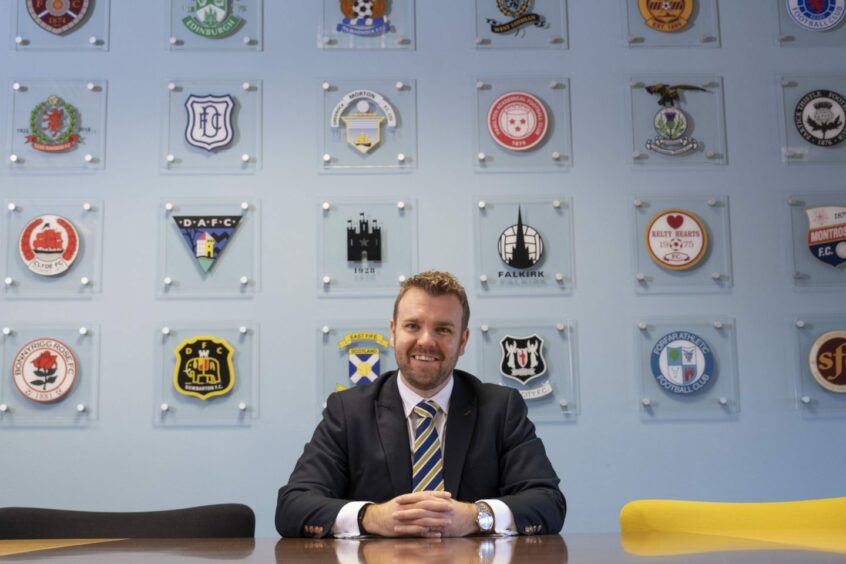Caley Thistle’s youth setup has been the starting point for many successful careers in football – but Calum Beattie’s story bucks the normal trend.
Inverness-born Beattie has recently been appointed the SPFL’s first chief operating officer, which carries with it the responsibility of administering the Scottish leagues.
The former Culloden Academy pupil was a youth player at Inverness between the age of eight and 16, at which point he opted to concentrate on his studies.
During his time at Inverness he played alongside the likes of Jamie Duff, Gavin Morrison and Dale Gillespie, while 2015 Scottish Cup winner Nick Ross was in the age category below.
By his own admission, Beattie was not up to the standard required to make the grade with Caley Jags.
Despite that, Beattie credits his early beginnings at his hometown club with shaping some of the understanding he now relies on for day-to-day tasks.
Caley Thistle was Beattie’s football breeding ground
Beattie said: “People ask me quite a lot about my background at Inverness. From my perspective, a big asset in my role is that I like to think I have a degree in understanding in the territory.
“There is the administrative side of the game, but it helps to have a knowledge of football.
“Although I never made it as a professional player – I wasn’t good enough – I played a lot of football when I was younger.
“I have been dealing with football people all my life and that has absolutely stood me in good stead.
“I probably never imagined I would go on to have the career I’ve had in football to date, because it wasn’t part of some kind of masterplan to be an administrator in football.
“Those early experiences have helped to shape my career, that’s for sure.”
After stepping away from football in his teenage years, Beattie went on to study law at Aberdeen University.
He started a traineeship at Shepherd and Wedderburn traineeship, based in London, Glasgow and Edinburgh, before qualifying as a corporate lawyer.
A career in the legal profession looked certain until nearly six years ago, when Beattie responded to an advert to shadow the long-serving Ian Blair as the assistant company secretary of the SPFL.
It was an opportunity which was too much for Beattie to resist.
He added: “In the legal profession you’ve got a very linear career path. You work your way up from being a trainee, to a solicitor, to an associate, and then a partner.
“I had that path ahead of me, but Scottish football is my passion. Very few opportunities come up to put your professional qualifications into something you love.”
Covid pandemic provided Beattie with baptism of fire
Blair’s retirement as SPFL secretary in 2021 invoked the handover which Beattie had been anticipating for four years.
But nothing could have prepared him for the circumstances he would be thrust into – during the early stages of Scottish football’s return from the Covid pandemic.
Beattie added: “Ian took a phased retirement, and it was supposed to be a smooth transition.
“I remember Ian saying: ‘you are doing very well, but let’s see how you cope in a crisis.’
“A month later, a global pandemic hit us.
“We persuaded Ian to stay on for another couple of months, but he stepped down in January 2021.
“I stepped in at that stage, just as League One and League Two had been suspended.
“We genuinely didn’t know what to do with two of our divisions (Premiership and Championship). so my first job was to do a conference call with those clubs to figure out how we were going to finish the season.
“It was a baptism of fire, a really tough couple of years throughout the pandemic – I don’t think I had a day off for about 18 months.
“As difficult as that was at the time for everybody, it has personally stood me in good stead for building relationships with clubs from there.”
Fixture congestion a common occurence
The task of fixture scheduling is one which often directs attention the SPFL’s way.
Factors including the success of Scottish clubs in Europe, or weather disruption, can regularly lead to fixture congestion.
That will intensify beyond 2024, when any Scottish club involved in the Champions League group stage will play 10 group fixtures rather than six.
Satisfying all parties is a nigh-on impossible task, however, transparency is at the heart of Beattie’s approach to explaining his decision making to clubs.
He added: “This is no criticism of any club, as I would do the same if I was in their shoes – clubs look at it through their own prism. They have one focus which is that club.
“My job is to look at it through 42 lenses, or if it’s one division then 10 or 12 lenses, and make sure we are applying the rules fairly.
“Fixture congestion a lot of the time is the price of success.
“Rangers last year, when they got to Seville (Europa League final), had a really intense schedule.
“Most clubs do accept that. The difficulty becomes that games are postponed because getting to a cup semi-final maybe dislocates somebody else’s home game.
“That then goes to a midweek in January when nobody wants to play, and you’ve got to have the discussion with the opponents to make sure they understand the reasons why.
“We often get asked why there aren’t more games in the summer months, or when the weather is better. The honest answer is we don’t have the dates, because we have to work around the UEFA and FIFA calendars which are becoming increasingly congested.
“It’s only going to become more congested because of the changes to European competitions post-2024.”




